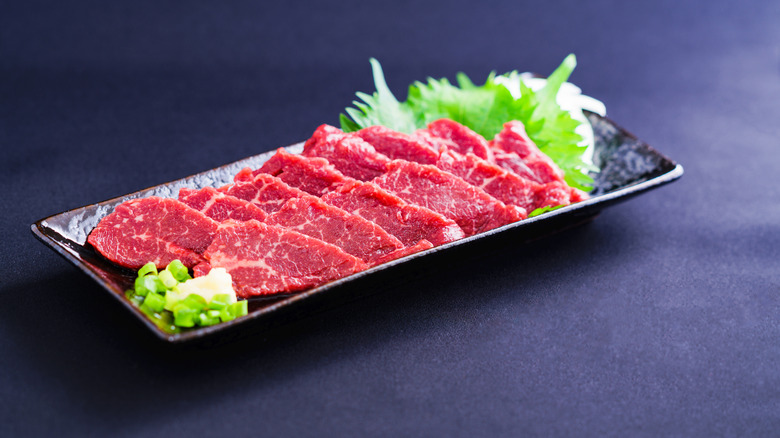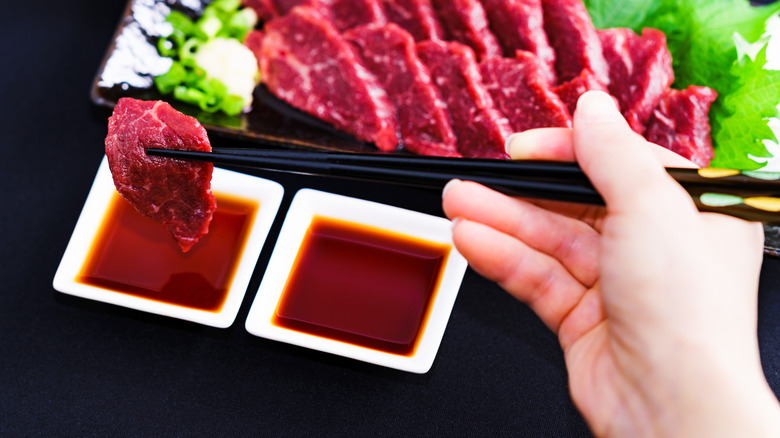'Cherry Blossom Meat' Is A Delicacy In Japan, But What Is It Exactly?
Japanese cuisine has seen its international profile soar to incredible heights in recent years, particularly in the United States, where classic dishes like sushi and ramen have been widely adopted and adapted. Those traveling to Japan for the first time may want to venture beyond these foods and discover those regional delicacies that have yet to hit it big on the international stage. A perfect example can be found in Kumamoto Prefecture, on the southern island of Kyushu, where local chefs specialize in preparing "sakura niku," which translates to English as "cherry blossom meat."
Despite its name, cherry blossom meat has nothing to do with actual cherry blossoms, and it is far from being vegetarian-friendly. Sakura niku refers to horse meat, so where does it get that name from? There are a few theories behind this, the most common being that fresh horse meat has the same bright red color as cherry blossoms. Others say that the name comes from the way raw horse meat is often arranged on plates, mimicking the shape of a cherry blossom. One final theory suggests that horses store more nutrients during the winter, so they are typically slaughtered for their meat in early spring, which happens to be the same season that cherry blossoms bloom in Japan. Whatever the reason behind it may be, the name doesn't tell us much about how this meat is prepared and what it tastes like.
Sakura niku is typically eaten raw, or in a hot pot
Sakura niku can be prepared using several techniques, but the best way to experience its vibrant cherry blossom hue is to eat it raw. This method of preparation is known as "basashi," or horse meat sashimi. It is essentially the same as the fish-based sashimi many people around the world have come to love, served in thin slices that you dip into soy sauce, with pickled ginger and wasabi as common accompaniments. If raw meat isn't your thing, consider trying sakura nabe — horse meat hot pot. It is made with a miso-based broth with eggs and assorted vegetables. Bamboo shoots, burdock roots, green onions, and konjac, a starchy root vegetable, are especially popular additions.
Eating horse meat is a relatively recent phenomenon in Japan, but so is eating any kind of meat. The nation was almost entirely vegetarian for roughly 1,200 years, beginning in the 7th century. Before that, various meats, including horse, had been popular, but then the people were introduced to Buddhism, with reincarnation as a core belief. It was thought that, by eating the flesh of animals, you risked eating your own reincarnated ancestors, and in 675 A.D., Emperor Tenmu banned the consumption of meat (limited agricultural resources also supported this decision). It was not until Emperor Meiji publicly announced his support for omnivorism in 1872 that meat landed back on Japanese plates. Basashi, however, did not really take off in popularity until the 1960s.
What does horse meat taste like?
While horse meat has grown increasingly popular in Japan over the past half century, it remains an unfamiliar taste to many Americans. In fact, horse meat is partially banned in the United States, and unless you're in a position to hunt your own, a trip to Japan for some sakura niku would actually be one of the best opportunities to try it. The flavor of horse meat is often compared to beef, though some find it to be gamier, more like beef with a little venison mixed in. Despite being leaner than beef or pork, it has an exceptionally tender texture, practically melting in your mouth (that is, as long as you don't cook it for long, a key reason that it's best enjoyed raw or lightly cooked in hot broth).
Horse meat is also quite nutritious. According to the National Library of Medicine, it contains higher levels of unsaturated fatty acids (the oft-labeled "good fats") than other red meats. This is attributed to the fact that horses typically eat a hay-based diet. Horse meat is a particularly good source of alpha-linolenic acid, a type of omega-3 fatty acid also found in nuts and seeds that has been shown to lower cholesterol levels and reduce the risk of both high blood pressure and heart disease. It's also rich in vitamins and minerals, especially phosphorus, iron, zinc, and copper. With less unhealthy saturated fat, horse meat has even been proposed as a healthier alternative to beef.


